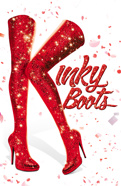Kinky Boots Director Jerry Mitchell on a Mysterious Package and a 'Magical' Message
About the author:
Tony winner Jerry Mitchell has enjoyed a celebrated career choreographing and/or directing Broadway musicals, including Hairspray, Legally Blonde, Grease, The Full Monty, La Cage aux Folles and Catch Me If You Can. Now Mitchell lends his considerable talents to Cyndi Lauper and Harvey Fierstein’s new Broadway musical Kinky Boots. Based on a true story and an indie film of the same name, Kinky Boots follows the unlikely friendship and business partnership between a London drag queen (Billy Porter) and a struggling Northampton shoemaker (Stark Sands). Below, Mitchell describes how decided to get Kinky, the task of casting his leading men and why the musical reminds him of the Tony-winning show Hairspray.
![]()
I became involved in Kinky Boots in an unusual and mysterious way. Several years back, I was at an awards dinner for David Rockwell in Central Park, and Daryl Roth approached me and said, “I have the rights to something special, and I’d like for you to direct and choreograph it.” She continued, “I’m not going to tell you what it is. I’ll send it to you.” Soon, I received a package at home, and it was Kinky Boots.
I had never seen the movie, but while I was in London doing The Full Monty, I saw the logo for the film’s album and thought, “Wow, that is a great title for a musical.” That was it; I gave it no further thought. So after receiving the package from Daryl, and learning that Hal Luftig was producing with her, I watched the movie, cried twice and called back saying, “Yeah, this is an amazing story—a really important human story—and I would love to tell it.”
Audiences may be surprised at first at how universal the story of Kinky Boots is. Everyone has a connection to a story that asks a man (or a woman) how they perceive themselves in their father’s eyes. I don’t know another story like that, and the theme is fully realized in Harvey Fierstein’s book and Cyndi Lauper’s score. “I’m Not My Father’s Son.” was one of the first songs Cyndi wrote for the show, and after my first listen, I knew she could write this musical. It literally brought me to tears when I heard it, then Harvey’s scene brought me to tears, and that’s when I knew, “OK, this is it; this is right.”
With the music and script in place, the team set our sights on finding two outstanding musical theater actors who would not only carry the show, but illuminate its heart. I’ve known Billy Porter since he was 19 years old, and I had an instinct that he was the right person to play Lola (very much like I had an instinct that Christian Borle was the right person to play Emmett in Legally Blonde). As for the other leading role, the first time we talked about this show, I said, “I want Stark Sands to play Charlie Price,” and as luck would have it, we got him. The thrilling thing about Stark and Billy is I don’t feel like I’m watching actors; I feel like I’m watching real people tell me a real story. That’s so important for Kinky Boots.
For me, the two most important things any show has to do are: 1. entertain the audience and keep them engaged, and 2. give the audience hope. When Kinky Boots played Chicago, we saw those two ingredients come together in a magical and rare way. After the show, people were walking up the aisles going crazy—like I remember people in the aisles at the end of Hairspray. The difference is that Kinky Boots has a more immediate quality because it’s today, whereas Hairspray was the '60s, and we’ve conquered that particular set of problems for the most part. This story is about equality and accepting people for who they are, and we haven’t completely conquered that yet. I really feel that everything I’ve done (from The Full Monty to Hairspray to La Cage aux Folles and more) has led me to this moment, and I’m so happy to share Kinky Boots with the world.
Related Shows
Star Files
Articles Trending Now
- 2025 Drama League Nominations Announced; Idina Menzel, Helen J Shen, Nicole Scherzinger, Lea Salonga and More Up for Awards
- Tony Winners Wendell Pierce and Sarah Paulson Will Announce 2025 Tony Nominations
- Redwood, Starring Idina Menzel, Will Release an Original Broadway Cast Recording in May; Debut Track Out Today


